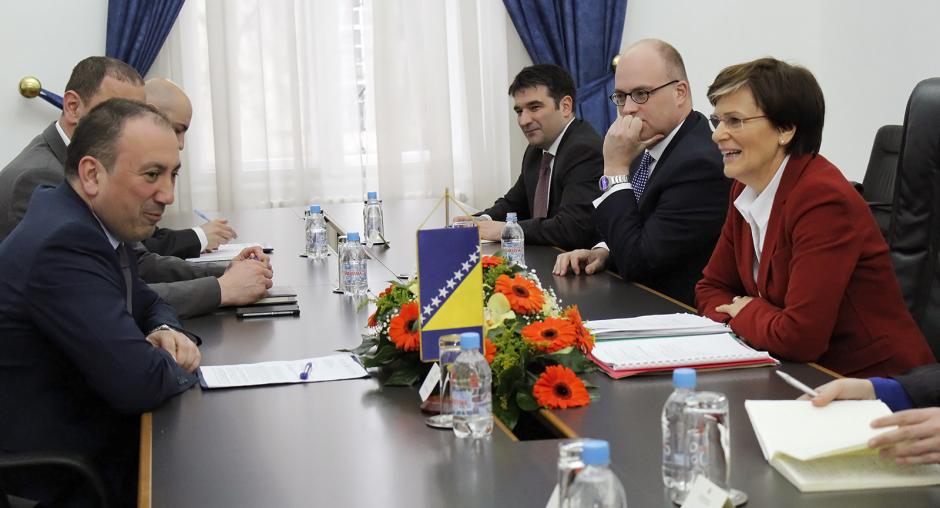High Commissioner on National Minorities visits Bosnia and Herzegovina and calls for quality inclusive education for all

The OSCE High Commissioner on National Minorities (HCNM) Astrid Thors visited Bosnia and Herzegovina from 20 to 24 March 2016, focusing extensively on education matters, visiting schools and educational facilities, meeting with pupils, parents and teachers and witnessing efforts made to bridge divides and develop joint activities.
Thors, accompanied by Ambassador Jonathan Moore, Head of the OSCE Mission to Bosnia and Herzegovina and assisted by the Mission’s Field Offices and staff, travelled from Sarajevo to Mostar and Banja Luka, as well as to other locations. She gained a first-hand and comprehensive picture of the situation experienced by persons belonging to national minorities in Bosnia and Herzegovina, as well as on wider issues pertaining to education, in accordance with her mandate.
"Providing quality education to pupils is a key determining factor for future employment and prosperity,” she stated during her visit. “The preparations to participate in the Programme for International Student Assessment (PISA) 2018 of the Organisation for Economic Development and Co-operation (OECD) are a sign of increased awareness of quality factors and the need for modernization.” PISA is an international survey, which evaluates education systems worldwide.
Earlier, on 22 March, Thors addressed the Second Annual Conference on the state of human rights and freedoms in Bosnia and Herzegovina, in Mostar. "The co-ordination of efforts in this field and the active role played by the Bosnia and Herzegovina Parliamentary Assembly’s Joint Committee on Human Rights are an indication that the parliamentarians are ready to ensure and oversee the protection of and respect for human rights standards,” she commented. Thors called for the protection of national minority rights to be secured whilst avoiding the segregation of communities along ethnic lines, which is consistent with the Ljubljana Guidelines on the Integration of Diverse Societies, published by HCNM in 2012. It is crucial to foster a sense of belonging for all members of society in order to effectively promote their integration, also through education and inclusive participation, she said.
Thors also held discussions with representatives of the State Council for National Minorities and the Republika Srpska’s Council on National Minorities, as well as briefly with members of the newly formed Council at the Federation of Bosnia and Herzegovina level. She requested all responsible institutions to move forward with adopting the Strategic Framework on National Minorities as a necessary tool for national minorities to enjoy their rights fully and for their effective participation in public and political life. She encouraged minority councils at different levels to proactively reach out to members of their communities, appealed for concerns articulated by the councils to be properly followed up by the authorities, and urged for a unified commitment to secure the implementation of the European Court of Human Rights’ ruling on the Sejdić and Finci case.
She met a broad range of key interlocutors throughout the country and at different levels. These included Igor Crnadak, Minister of Foreign Affairs of Bosnia and Herzegovina; Marinko Čavara, President of the Federation of Bosnia and Herzegovina; Milorad Dodik, President of Republika Srpska; Dane Malešević, Minister of Education of Republika Srpska; Semiha Borovac, Minister of Human Rights and Refugees of Bosnia and Herzegovina; Adil Osmanović, Minister of Civil Affairs of Bosnia and Herzegovina; Borislav Bojić, Chair of the Joint Committee on Human Rights of the Bosnia and Herzegovina Parliamentary Assembly; and Rašid Hadžović, Minister of Education of the Herzegovina-Neretva Canton. She also met diplomats and representatives of the international community based in the country.
Thors expressed her willingness to continue to engage with domestic institutions at different levels, with representatives of national minorities and with relevant partners in the international community to foster societal cohesion and quality, inclusive education policies.
